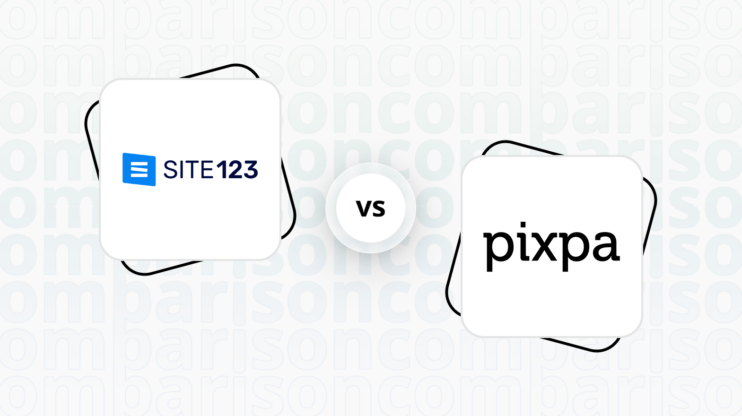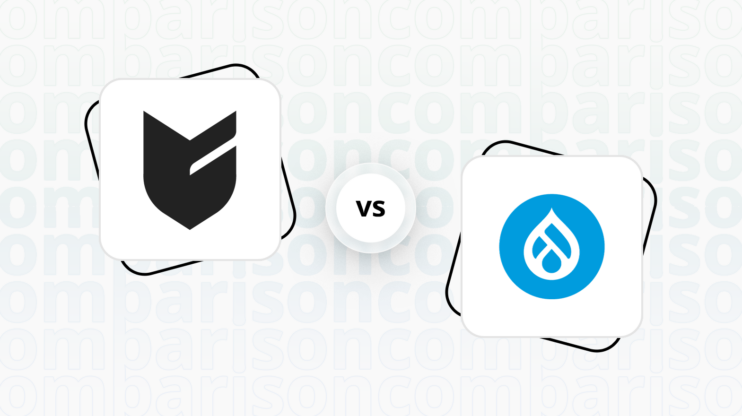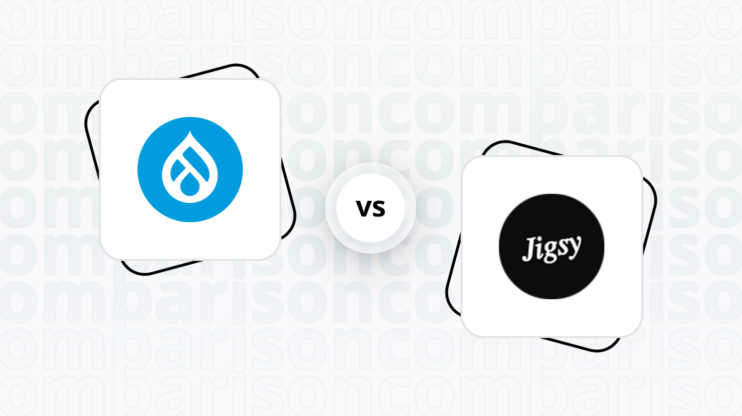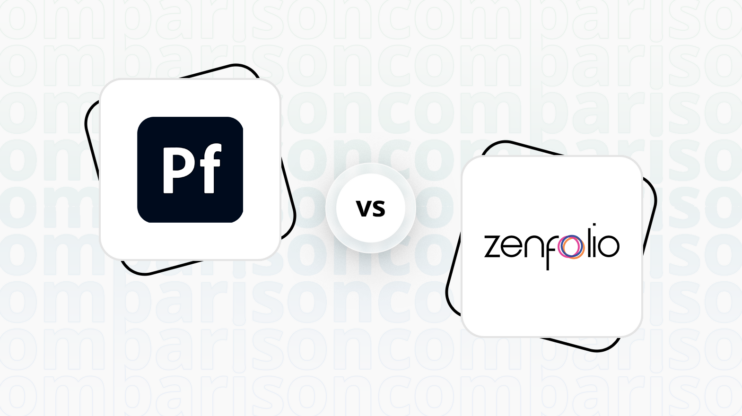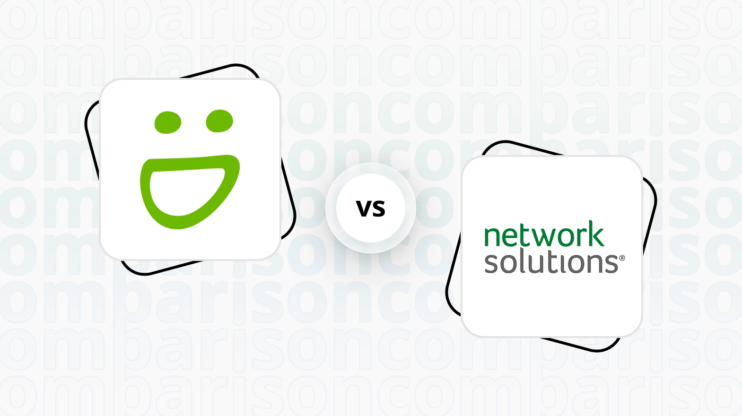Final verdict
iPage and Webnode both offer unique advantages, but they cater to different user needs and preferences.
-
iPage (Overall Grade: 6.1/10)
is a user-friendly web hosting and site builder platform that excels in providing comprehensive services, including hosting, domain registration, and e-commerce solutions. It is particularly suitable for small businesses and personal projects. iPage’s strengths lie in its robust hosting quality, advanced marketing features, and 24/7 customer support. However, it may feel somewhat limited in design options and advanced customization compared to more sophisticated builders. When comparing iPage vs Webnode, iPage is ideal for users seeking a reliable hosting solution with integrated website building capabilities. -
Webnode (Overall Grade: 6.5/10)
stands out with its user-friendly drag-and-drop interface and customizable templates, making it perfect for beginners and those looking to create simple websites quickly and easily. Webnode offers a more flexible product testing environment, better design functionalities, and a slightly higher ease of use score. It also provides a more advanced AI builder and extensive user management options. Considering iPage vs Webnode, Webnode is a great choice for users who prioritize ease of use, design versatility, and budget-friendly options.

|

|
|
|---|---|---|
|
Design functionalities & templates |
7.0 |
7.1 |
|
Ease of use |
7.6 |
8.0 |
|
Ecommerce |
5.7 |
6.3 |
|
Website Editors |
6.8 |
7.3 |
|
Product testing options |
2.5 |
5.3 |
|
Price |
7.3 |
7.7 |
|
Hosting quality |
7.7 |
6.3 |
|
Website speed optimization |
7.4 |
6.1 |
|
Plugins and integrations |
6.3 |
6.8 |
|
Marketing features |
7.2 |
5.5 |
|
Customer support |
6.9 |
5.3 |
|
Security |
7.5 |
7.7 |
|
AI capabilities |
3.0 |
5.3 |
|
User Management |
3.2 |
6.9 |
Best for ecommerce
 5.7
5.7
 6.3
6.3
Verdict
: iPage and Webnode both offer essential ecommerce features, but they cater to different user needs and business sizes. iPage is more suitable for small to medium-sized businesses with simpler ecommerce requirements, while Webnode offers a more user-friendly interface with basic ecommerce functionalities.
-
iPage
: iPage provides a range of ecommerce features such as inventory management, coupon codes, and PayPal integration. It is ideal for small businesses looking for a straightforward solution. However, it may lack the advanced customization and integration options found in more specialized platforms. Best For Ecommerce score: 5.7. -
Webnode
: Webnode excels with its user-friendly drag-and-drop interface and offers essential ecommerce functionalities like shipping options and order management. It is a good choice for beginners who want to set up a simple online store quickly. However, it may have limitations in terms of advanced features and customization. Best For Ecommerce score: 6.3.
Best for informational & business websites
 7.2
7.2
 7.2
7.2
Verdict
: When it comes to creating informational and business websites, both iPage and Webnode offer unique advantages. However, Webnode slightly edges out iPage due to its better design functionalities and ease of use.
-
iPage
: iPage is a user-friendly web hosting and site builder platform that offers a range of services including hosting, domain registration, and e-commerce solutions. It targets small businesses and personal projects, providing templates and a drag-and-drop builder to simplify website creation. While iPage is a solid choice for those looking for a comprehensive hosting solution, it may feel somewhat limited in design options compared to more advanced builders. -
Webnode
: Webnode is a website builder that allows users to create websites without any coding knowledge. It uses a drag-and-drop interface and offers free plans with limitations on storage and features. Paid plans provide more storage, custom domain names, and the ability to remove Webnode ads. Webnode’s straightforward interface and customizable templates make it particularly suitable for beginners looking to create websites quickly and easily. When comparing iPage vs Webnode, Webnode’s user-friendly interface and better design functionalities make it a more versatile choice for informational and business websites.
Detailed comparison
Design functionalities & templates
Design FunctionalitiesRepresents how well each platform allows for creative design and customization of websites.Score Components:
- Template Variety (30%): Range and quality of design templates.
- Customization (30%): Flexibility and options for design alterations.
- User Interface (20%): Ease and intuitiveness of the design process.
- Responsiveness (10%): Adaptability to different devices and screen sizes.
- Innovation (10%): Unique design features and tools.
 7.0
7.0
 7.1
7.1
🏆
Winner: Webnode.
Webnode edges out iPage with slightly better design functionalities and template options, making it a more versatile choice for users seeking a balance between ease of use and customization.
iPage offers a wide variety of templates and designs, catering to users with diverse needs and preferences. With hundreds of options available, ranging from simple and elegant to complex and dynamic, users can easily find a template that suits their specific project or business requirements. These templates are also customizable, allowing for a high degree of personalization in terms of layout, color schemes, and functionality.
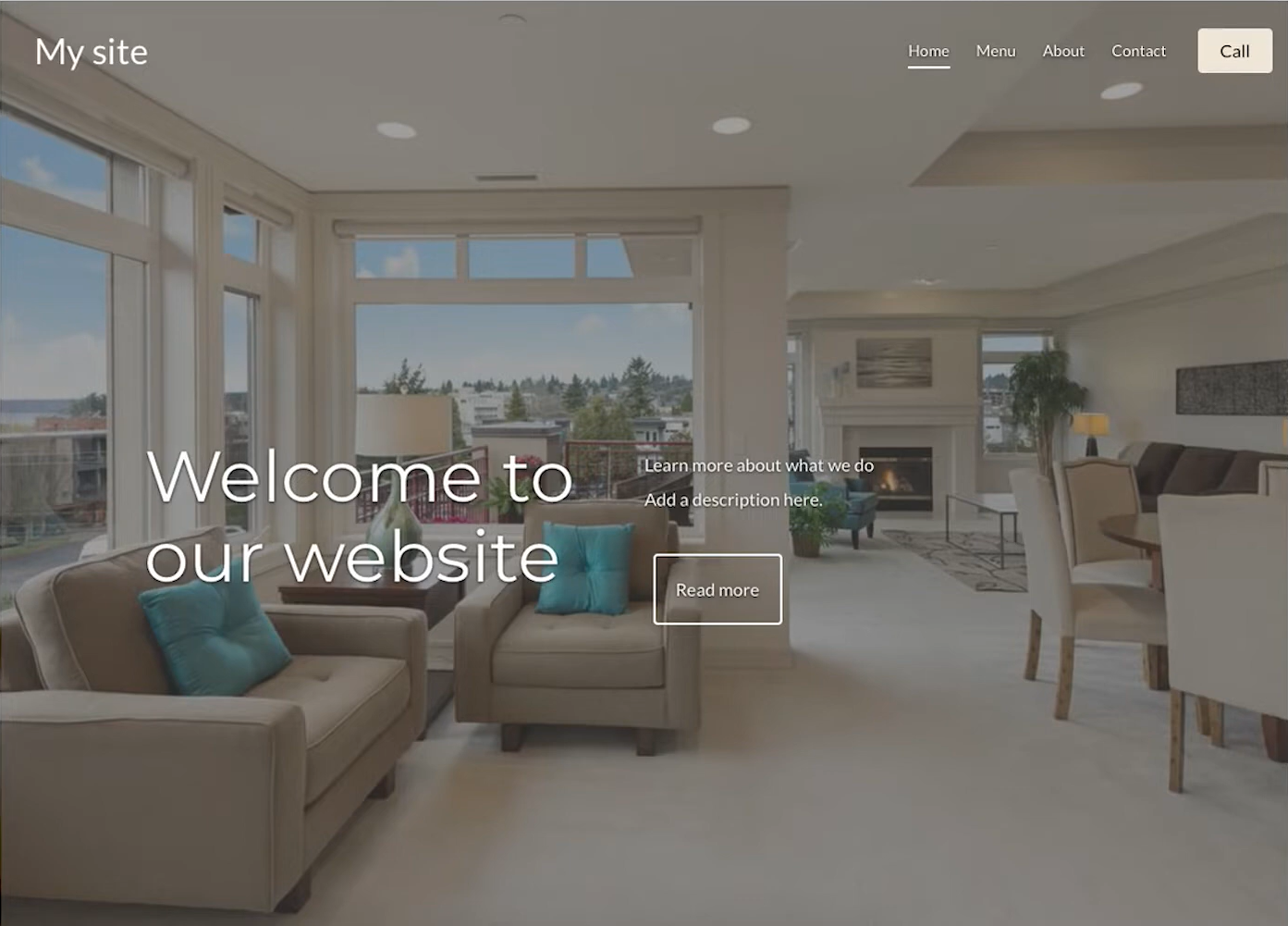
Compared to iPage, Webnode offers a variety of website templates designed for different purposes, from business and portfolios to restaurants and travel. These templates are customizable and responsive, ensuring they display well on any device. While an exact number isn’t available, Webnode provides a wide selection to cater to diverse website needs.
Get a head start on website creation with AI
Create a custom website tailored to your business needs 10X faster with 10Web AI Website Builder!
Ease of use
Ease of useReflects the platform’s overall user-friendliness.Score
Components:
- Learning curve (40%): Quickness and ease of getting started.
- Interface design (30%): Simplicity and intuitiveness of layout.
- User guidance (20%): Quality of tutorials and support.
- Flexibility (10%): Adaptability to various user skills.
 7.6
7.6
 8.0
8.0
🏆 Winner: Webnode
. Scoring an 8.0, Webnode is slightly ahead of iPage, which scores 7.6. Webnode’s straightforward interface and drag-and-drop functionality make it particularly suitable for beginners looking to create websites quickly and easily. iPage also offers a user-friendly experience with its drag-and-drop builder, but it may feel somewhat limited in design options compared to more advanced builders.
Learning Resources
🏆 Winner: Webnode
. Both platforms provide a variety of learning resources, including video tutorials and knowledge bases. However, Webnode’s resources are generally more comprehensive and accessible, covering a wide range of topics to assist users of all skill levels.
For ecommerce
EcommerceMeasures the platform’s effectiveness in supporting online business activities.Score Components:
- Ecommerce themes and templates (20%): Variety and design of templates.
- Product management (25%): Ease of managing and organizing products.
- Payment options (25%): Variety and convenience of payment methods.
- Ecommerce features (20%): Features for managing an ecommerce store.
- Integration (10%): Compatibility with external e-commerce tools and services.
 5.7
5.7
 6.3
6.3
iPage and Webnode both offer essential ecommerce features, but they cater to different user needs and business sizes. iPage is more suitable for small to medium-sized businesses with simpler ecommerce requirements, while Webnode offers a more user-friendly interface with basic ecommerce functionalities.

|

|
|
|---|---|---|
|
Ecommerce themes and templates |
5.5 |
6.5 |
|
Product page customization |
5.0 |
7.0 |
|
Payment processing and commissions |
6.0 |
6.8 |
|
POS capabilities |
3.0 |
4.0 |
|
Payment gateways |
6.5 |
7.0 |
|
Product numbers |
4.0 |
5.5 |
|
Additional ecommerce features |
5.5 |
6.0 |
iPage ecommerce features:
- Inventory Management and Tracking
- Coupon Codes and Promotions
- SEO Tools
- PayPal Integration
Webnode ecommerce features:
- Shipping options
- Payment gateway integrations
- Order management
- Coupons and discounts
Ecommerce themes & templates
iPage offers a variety of ecommerce-specific templates designed to cater to online stores and businesses. These templates are integrated with features such as shopping carts, product catalogs, and payment processing options to facilitate online transactions. However, the exact number of ecommerce templates available can vary, and users might find some limitations in terms of customization and advanced ecommerce functionalities compared to specialized ecommerce platforms.
Webnode offers ecommerce-specific templates designed for creating online stores, though the exact number of templates available may vary over time. These templates typically come with features such as product showcasing, shopping cart functionality, support for various payment gateways, and customization options. However, users should be mindful of potential limitations such as customization restrictions, feature limitations based on plan tiers, transaction fees, and integration limitations when choosing a template and plan for their ecommerce website on Webnode.
Product page customization
iPage’s website builder offers a range of ecommerce product page customization options, allowing users to design their storefronts with various templates, adjust layouts, and incorporate multimedia elements like images and videos to showcase products. Users can also edit product descriptions, manage inventory, and set up different payment options. However, limitations may include less flexibility in advanced customization or coding for those who require unique, highly tailored functionalities beyond the provided templates and settings. Additionally, compared to specialized ecommerce platforms, iPage might offer fewer integrations with external tools and apps.
Webnode provides users with extensive customization options for product pages, allowing for the creation of visually appealing and informative displays. Through customizable content blocks, product images and galleries, and tailored product descriptions, users can effectively showcase their products. Additionally, features such as customizable call-to-action buttons, product variations, and SEO optimization contribute to a seamless and optimized shopping experience.
Payment processing
iPage supports several payment options for eCommerce, including major gateways like PayPal, Stripe, and others, catering to a wide range of currencies and countries. iPage does not charge commissions for transactions, commissions are charged by the gateways themselves. While iPage offers flexibility in online payment processing, it does not explicitly mention integrated POS capabilities for in-person transactions. For billing and subscription payments, iPage accepts credit cards, PayPal, and check or money order, offering diverse payment methods for its users.
Webnode website builder supports various payment gateways, including popular options like PayPal and Stripe, for online transactions. While Webnode itself doesn’t charge commissions on transactions, payment gateways may have their own fee structures. Webnode primarily focuses on facilitating online transactions and doesn’t provide native POS capabilities, although integration with third-party POS solutions may be possible. For the latest information on supported payment gateways, transaction fees, and POS integrations, users should refer to Webnode’s official documentation or contact their customer support.
Website Editors
Website EditorsEvaluates the platforms’ website building and editing capabilities.Score Components:
- Customization tools (40%): Range and power of editing features.
- Editor usability (30%): User experience within the editor.
- Design flexibility (20%): Freedom in layout and design changes.
- Update and maintenance ease (10%): Simplicity of updating and maintaining the site.
 6.8
6.8
 7.3
7.3
🏆
Winner: Webnode
. Webnode, with a score of 7.3, provides a user-friendly drag-and-drop interface with customizable templates, enabling users to easily create professional-looking websites without coding skills. The editor offers responsive design capabilities and multilingual support, catering to diverse audiences across different devices and languages. Built-in features such as SEO tools, e-commerce functionality, and analytics integration empower users to optimize their websites for search engines, sell products online, and track performance metrics effectively.
iPage’s editor, scoring 6.8, is designed for ease of use, catering to both beginners and those with some web design experience. It offers a drag-and-drop interface, allowing users to easily add, remove, and customize elements on their web pages without needing to code. Users can choose from a variety of templates that are responsive and customizable to fit their brand or personal style. However, it may offer fewer features and less refined design capabilities compared to more sophisticated website builders.
Mobile editor/app
 5.0
5.0
 5.5
5.5

🏆
Winner: Webnode
. Both iPage and Webnode do not offer dedicated mobile editor apps, but they allow users to edit their websites through mobile browsers. This feature comes with certain limitations on both platforms.
iPage’s mobile editing capabilities are basic, allowing users to make adjustments on the go, but the experience may not be as seamless or feature-rich as desktop editing. It is designed to be user-friendly, especially for beginners, but some users might find the options and settings a bit overwhelming initially.
Webnode, while also lacking a dedicated mobile app, provides a slightly better mobile editing experience. Users can utilize the mobile browser version of the editor to make changes to their websites. The platform’s drag-and-drop interface and customizable templates make it accessible for beginners, though advanced customization may still pose challenges.
In summary, Webnode edges out iPage with a marginally better mobile editing experience, making it a more suitable option for users who need to make quick edits on the go.
Product testing options
Product Testing OptionsAssesses the options for trying out platform features before commitment.Score Components:
- Trial quality (40%): Extent and usefulness of the trial or free version.
- Feature accessibility (30%): How many features are available to test.
- Trial duration (20%): Length of the trial period.
- Ease of transition (10%): Smoothness of moving from trial to paid plans.
 2.5
2.5
 5.3
5.3
Overall Result
:
Webnode wins
. Webnode scores 5.3, offering a more flexible product testing environment compared to iPage’s score of 2.5. Webnode provides a free plan with basic features, allowing users to test the platform indefinitely, although with some limitations. iPage, while offering a 30-day money-back guarantee, does not have a free trial, which limits initial testing without financial commitment.

|

|
|
|---|---|---|
|
Free Plan |
No |
Yes |
|
Trial Duration |
No free trial | No |
|
Testing Premium Features |
All features during 30-day refundable period |
Some features with free plan |
|
Money-back Guarantee |
30-day money back guarantee | 15-day money back guarantee |
Price
PriceLooks at the cost-effectiveness and value for money of each platform.Score Components:
- Plan value (40%): What each pricing tier offers.
- Transparency and clarity (30%): Clearness of pricing structures.
- Flexibility of plans (20%): Range of options to suit different budgets.
- Hidden costs (10%): Additional expenses not included in the plan.
 7.3
7.3
 7.7
7.7
Webnode offers more budget-friendly options, while iPage provides more comprehensive plans with significant discounts for annual subscriptions.

|

|
|
|---|---|---|
|
$0-$10 |
No offering at this amount. |
LIMITED ($5.50/month): Basic plan, 200 MB storage, attach domain, website statistics, up to 5 form fields, last 30 days backup. This plan allows to manage 1 website with unlimited number of pages. Value for Price: 3.0 |
|
$10-$20 |
No offering at this amount. |
MINI ($10.00/month): All essentials for a simple website, 1 GB storage, 3 GB bandwidth, website statistics, 1 email account. This plan allows to manage 1 website with unlimited number of pages. Value for Price: 4.5 |
|
$20-$30 |
Basic ($15.99/month): Simple website or blog, 1 website, 10 GB SSD, free domain, managed WordPress, free SSL for 1st year. Value for Price: 6.5 |
STANDARD ($16.90/month): For starting an online store, 3 GB storage, 10 GB bandwidth, 20 email accounts, basic store features. This plan allows to manage 1 website with unlimited number of pages. Value for Price: 6.0 |
|
$30-$34 |
Choice Plus ($27.99/month): Multiple sites with storage, security, backups, 3 websites, 40 GB SSD, daily backups, domain privacy, malware scanning. Value for Price: 7.5 |
PROFI ($26.50/month): Professional websites, 7 GB storage, unlimited bandwidth, 100 email accounts, full online store capabilities. This plan allows to manage 1 website with unlimited number of pages. Value for Price: 7.5 |
|
$34+ |
Online Store ($32.99/month): Online selling with eCommerce tools, 3 websites, 40 GB SSD, store features like unlimited products and secure payments. Value for Price: 8.0 |
No offering at this amount. |
location. As a result in rare cases the prices displayed here can differ from the ones you see on their
websites.
Hosting quality
Hosting
qualityExamines the reliability and performance of the hosting solutions.Score Components:
- Uptime (40%): Consistency and reliability of website availability.
- Speed (30%): Loading times and performance.
- Bandwidth and storage (20%): Sufficiency of resources provided.
- Data centers (10%): Quality and distribution of hosting infrastructure.
 7.7
7.7
 6.3
6.3
🏆
Winner: iPage
iPage offers a more comprehensive hosting solution with managed WordPress hosting, unlimited storage, and bandwidth, making it suitable for a variety of website needs. Despite some performance and scalability limitations, it outperforms Webnode, which does not disclose its hosting type or data center locations and has a lower uptime percentage.

|

|
|
|---|---|---|
|
Do they offer hosting? |
Yes, a range of affordable hosting services including shared, WordPress, and VPS hosting |
Yes, with from 1GB to unlimited bandwidth and automated backups on higher plans |
|
Data Centers: |
2 data centers: US, Europe |
Webnode does not disclose the locations of its data centers |
|
Type of hosting: |
Managed WordPress Hosting |
Webnode does not disclose its hosting type |
|
Uptime: |
99.9% |
99.6% |
|
Uptime Guarantee: |
No |
No |
Website Speed Optimization
Website Speed OptimizationEvaluates optimization of website loading timesScore Components:
- PageSpeed Score (30%): Google’s score indicating performance optimization.
- Loading Time (30%): The average time until a website is fully interactive.
- Mobile Optimization (15%): Optimization effectiveness for mobile devices.
- Resource Optimization (15%): Optimizing images, scripts, and other heavy resources.
- CDN Usage (10%): Use of CDN to enhance speed across geolocations.
 7.4
7.4
 6.1
6.1
🏆 Winner: iPage
Both iPage and Webnode have their own strategies for optimizing website speed, but iPage has a slight edge due to its comprehensive approach and better performance metrics.

|

|
|
|---|---|---|
|
Focus |
Web Server optimizations, Caching, CDN, Database optimization, SEO optimization |
Code Minification, Image Optimization, Caching |
|
Performance Tools |
Google PageSpeed Insights |
Google PageSpeed Insights |
|
Key Strategies |
Web Server optimizations, Caching, CDN, Database optimization, SEO optimization |
Code Minification, Image Optimization, Caching |
|
Load Times |
2.6s average |
Varies depending on optimization |
|
Page Speed Scores Range |
72/100 average |
Varies depending on optimization |
|
Core Web Vitals Improvement |
LCP, FID, CLS improvements |
No information provided |
iPage is a user-friendly web hosting and site builder platform that offers a range of services including hosting, domain registration, and e-commerce solutions. It targets small businesses and personal projects, providing templates and a drag-and-drop builder to simplify website creation. iPage has partnered with Bluehost to offer unified and improved hosting and pricing plans. iPage’s strategies for speed optimization include web server optimizations, caching, CDN, database optimization, and SEO optimization. The platform has an average load time of 2.6 seconds and an average PageSpeed score of 72/100. iPage also focuses on improving Core Web Vitals such as LCP, FID, and CLS.
Webnode, on the other hand, is a website builder that allows users to create websites without any coding knowledge. It uses a drag-and-drop interface and offers free plans with limitations on storage and features. Paid plans provide more storage, custom domain names, and the ability to remove Webnode ads. Webnode’s strategies for speed optimization include code minification, image optimization, and caching. However, the platform does not provide specific information on load times, PageSpeed scores, or Core Web Vitals improvements. This lack of detailed performance metrics makes it difficult to assess Webnode’s effectiveness in optimizing website speed compared to iPage.
Get a head start on website creation with AI
Create a custom website tailored to your business needs 10X faster with 10Web AI Website Builder!
Plugins and integrations
Plugins and integrationsMeasures the range and effectiveness of additional plugins and integrations.Score Components:
- Variety of options (40%): Range of available add-ons.
- Integration smoothness (30%): Ease of integrating plugins into the site.
- Quality of plugins (20%): Functionality and reliability of the options.
- Custom integration capabilities (10%): Support for custom or third-party integrations.
 6.3
6.3
 6.8
6.8
🏆 Winner: Webnode.
Webnode scores 6.8, slightly ahead of iPage’s 6.3, thanks to its extensive range of Elfsight plugins that enhance website functionality and user engagement. Webnode’s plugins cover a wide array of applications, including social media, reviews, e-commerce, chats, and forms, providing users with a comprehensive set of tools to improve their website’s capabilities.
iPage, while offering a variety of plugins and extensions, focuses more on SEO tools, security enhancements, and e-commerce capabilities. These plugins come with various pricing options, allowing users to customize their websites according to their needs and budget. However, Webnode’s broader range of plugins gives it a slight edge in this comparison.

Marketing Features
Design FunctionalitiesRepresents how well each platform allows for creative design and customization of websites.Score Components:
- Template Variety (30%): Range and quality of design templates.
- Customization (30%): Flexibility and options for design alterations.
- User Interface (20%): Ease and intuitiveness of the design process.
- Responsiveness (10%): Adaptability to different devices and screen sizes.
- Innovation (10%): Unique design features and tools.
 7.2
7.2
 5.5
5.5
🏆
Overall Winner: iPage
. iPage excels with its comprehensive marketing tools, including advanced SEO features, integrated email marketing, and robust analytics. Webnode, while user-friendly, offers more basic marketing functionalities.

|

|
|
|---|---|---|
|
SEO Tools |
✓ |
✓ |
|
Email Marketing |
✓ |
✓ |
|
Blogging |
✓ |
✓ |
|
Social Media Integration |
Integrated social media buttons and features |
User-friendly integration with major platforms |
|
Analytics and Reporting |
Option to integrate Google Analytics for comprehensive analytics |
Integration with Google Analytics and Search Console |
|
Ads and Promotions |
Offers SEO, social media integration, email marketing, and promotional discounts |
Google AdSense and Ads.txt integration for ad revenue |
Customer Support
Customer supportEvaluates the quality and availability of support options.Score Components:
- Response time (40%): Speed of support responses.
- Support quality (30%): Effectiveness and helpfulness of the support.
- Availability (20%): Range of support channels (phone, chat, email).
- Resource richness (10%): Quality of self-help and educational materials.
 6.9
6.9
 5.3
5.3
🏆 Winner: iPage
. In the iPage vs Webnode comparison, iPage takes the lead with a customer support score of 6.9. iPage offers 24/7 customer support through phone, email, and live chat, ensuring that users can get assistance at any time. This round-the-clock availability is a significant advantage for users who may need help outside of regular business hours.
Webnode, on the other hand, has a customer support score of 5.3. While it provides support in more than 20 languages and aims to respond to inquiries within 24 hours, its support is limited to weekdays and primarily through email. Premium customers do receive priority phone support, but the lack of general phone and live chat support can be a drawback for users needing immediate assistance.
Overall, iPage’s comprehensive and always-available support options make it the better choice for users who prioritize accessible and responsive customer service.
Security
SecurityLooks at the platforms’ security measures and data protection.Score Components:
- Data protection (40%): Safeguards for user and customer data.
- SSL and encryption (30%): Implementation of secure connections.
- Compliance (20%): Adherence to industry security standards.
- Regular updates (10%): Frequency of security updates and patches.
 7.5
7.5
 7.7
7.7
🏆
Winner: Webnode
. Webnode slightly edges out iPage in terms of security, scoring 7.7 compared to iPage’s 7.5. Webnode offers comprehensive security measures, including HTTPS for all sites, IP Filters, Form Protection, and Malware Scanning for Premium Plan users. Additionally, Webnode supports GDPR compliance, ensuring user data is handled according to strict privacy regulations.
iPage also provides robust security features, such as SiteLock for malware protection and SSL certificates for data encryption. However, its security score of 7.5 indicates it falls just short of Webnode’s offerings. iPage’s Domain Privacy Protection is a notable feature, shielding personal information from public databases, which is particularly beneficial for maintaining privacy.
AI Capabilities
AI capabilitiesMeasures the effectiveness of AI-driven features and tools.Score Components:
- Automation efficiency (40%): Impact of AI on streamlining processes.
- Personalization (30%): AI-driven customization for users or customers.
- AI-Assisted design (20%): Role of AI in website design and functionality.
- Data analysis (10%): Use of AI in interpreting user data and analytics.
 3.0
3.0
 5.3
5.3

|

|
|
|---|---|---|
|
AI Builder |
iPage offers an AI-powered website builder for easy customization |
Webnode’s AI builder generates custom websites based on user needs |
|
AI Ecommerce Features |
|
|
|
AI Content Generation |
|
|
|
Additional AI Features |
Basic setup assistance |
|
🏆 Winner: Webnode
. Webnode, with a score of 5.3, offers a more advanced AI builder that generates custom websites based on user inputs, making it more user-friendly and efficient for beginners. Although it lacks additional AI features, its AI builder is more sophisticated compared to iPage.
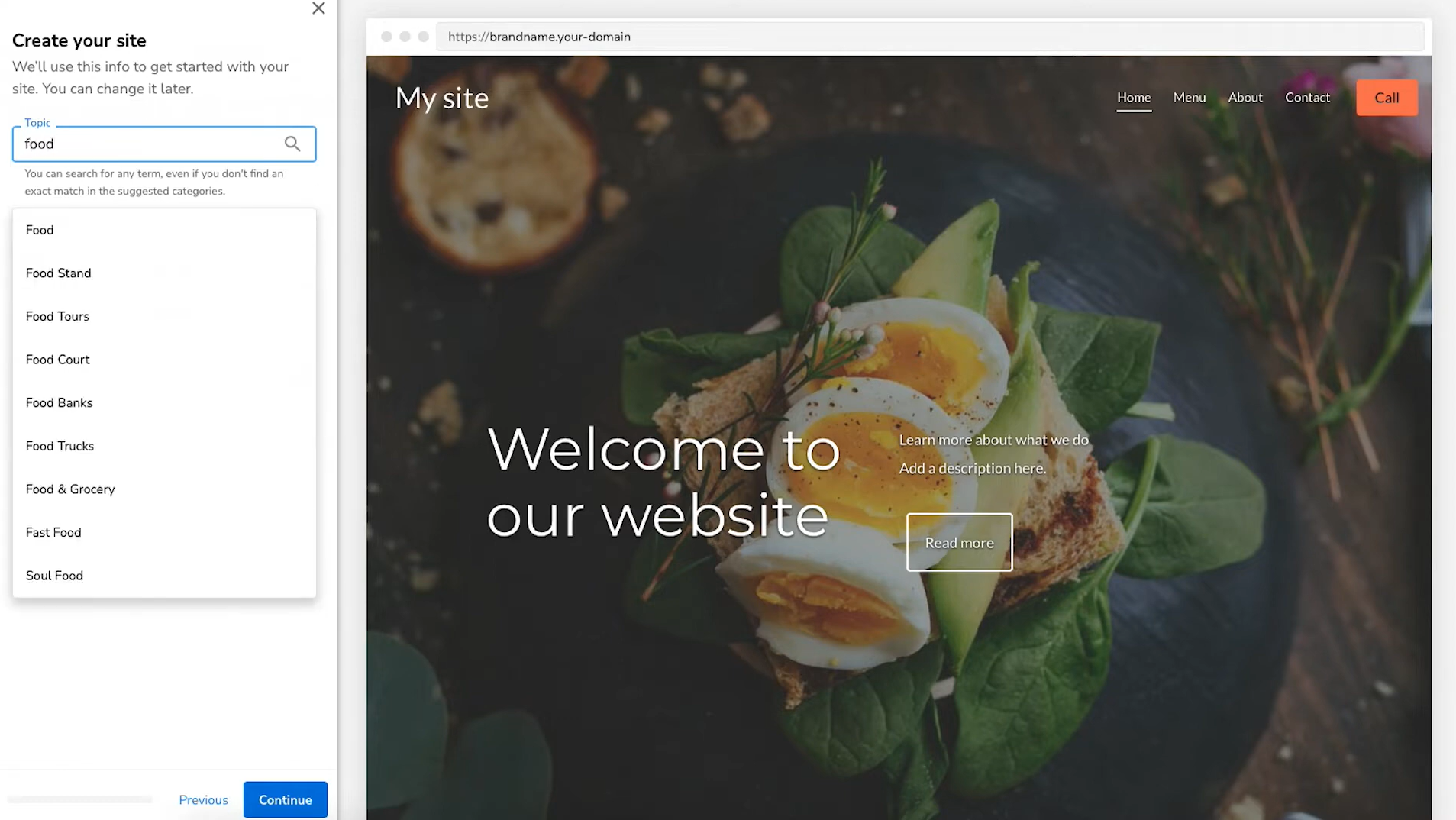
iPage, scoring 3.0, provides an AI-powered website builder that simplifies the website creation process but lacks advanced AI functionalities such as content generation or ecommerce features. Its AI capabilities are primarily focused on assisting users in setting up their websites efficiently.
User Management
User ManagementAssesses the platforms’ capabilities in managing user roles, permissions, and accessibility.Score Components:
- Role Customization (40%): Flexibility in creating and defining user roles and
permissions. - Ease of Management (30%): User interface and tools for managing users.
- Access Control (20%): Effectiveness of access control measures for different user
levels. - Scalability (10%): Ability to manage a growing number of users efficiently.
 3.2
3.2
 6.9
6.9
🏆 Winner: Webnode
. Managing your online team with iPage and Webnode involves different levels of user access and role management.
- iPage’s website builder offers very limited multi-user functionality and access levels compared to more sophisticated website builder platforms.
- Webnode allows multiple users to manage and edit a website, with the number of users varying depending on the subscription plan. The free version provides limited user access, while premium plans offer more flexibility, including the ability to add multiple users with different roles and permissions.
Webnode User Roles and Access Levels:
| Role | Description | Access Highlights |
|---|---|---|
| Website Owner | The individual or entity that owns the Webnode website. | Full access: can modify site structure, design, content, and manage user roles. |
| Administrator | Users with administrative privileges assigned by the website owner. | Nearly full access, including content management, and some settings adjustments. |
| Editor | Users tasked with creating, editing, and publishing content. | Access to add and edit content, blog posts, and pages, but cannot alter design. |
| Contributor | Users who can contribute content but cannot publish it. | Can draft content but need approval from an Editor or Administrator to publish. |
| Viewer/Visitor | Individuals who visit the website without any editing permissions. | Can view the public website and interact through comments or contact forms. |
| E-commerce Manager | Specifically for websites with an e-commerce component, managing products. | Can add, edit, and manage products, orders, and customer interactions. |
Additional Features

|

|
|
|---|---|---|
|
SSL Certificate |
✓ |
✓ |
|
Custom Domain |
✓ |
✓ |
|
Free Custom Domain Included |
✓ |
✓ |
|
International Domains |
✓ |
✓ |
|
Mobile Responsive |
✓ |
✓ |
|
Page Speed |
✓ |
✓ |
|
Website Builder Mobile App |
X |
X |
|
Convert a Website To An App |
X |
X |
|
Website Analytics |
✓ |
✓ |
|
Multilingual Sites |
✓ |
✓ |
|
Multiple Users |
✓ |
✓ |
User Feedback
User feedback on Webnode highlights its ease of use, rapid website creation capabilities, and the wide range of templates available, making it a popular choice for individuals and businesses seeking an intuitive web development platform. While praised for its user-friendly interface and quick setup, including domain purchase and application, some users express a desire for more flexibility and customization options, especially in themes and e-commerce features. Comparatively, it falls short on advanced functionalities such as SEO tools and widgets offered by competitors like WordPress. Customer service experiences vary, with some users facing challenges in getting support for email hosting and analytics integration. Overall, Webnode is celebrated for its ability to accommodate users with little to no coding knowledge, offering an accessible solution for creating professional websites, though it may not fully meet the needs of those requiring more complex site features or dedicated customer support.
In the comparison of iPage vs Webnode, iPage does not have available user feedback on the G2 platform, making it challenging to directly compare user satisfaction levels. However, iPage’s partnership with Bluehost and its comprehensive services, including hosting, domain registration, and e-commerce solutions, position it as a robust option for small businesses and personal projects. The lack of specific user feedback data for iPage means potential users might need to rely on other sources or personal trials to gauge its effectiveness and user satisfaction.
The making of this blog
We followed a clear, step-by-step process to write and research this article.
FAQ
Which platform is better for beginners, iPage or Webnode?
Can I use both iPage and Webnode for ecommerce?
How do iPage and Webnode differ in terms of customization and design flexibility?
What are the major differences in pricing between iPage and Webnode?











